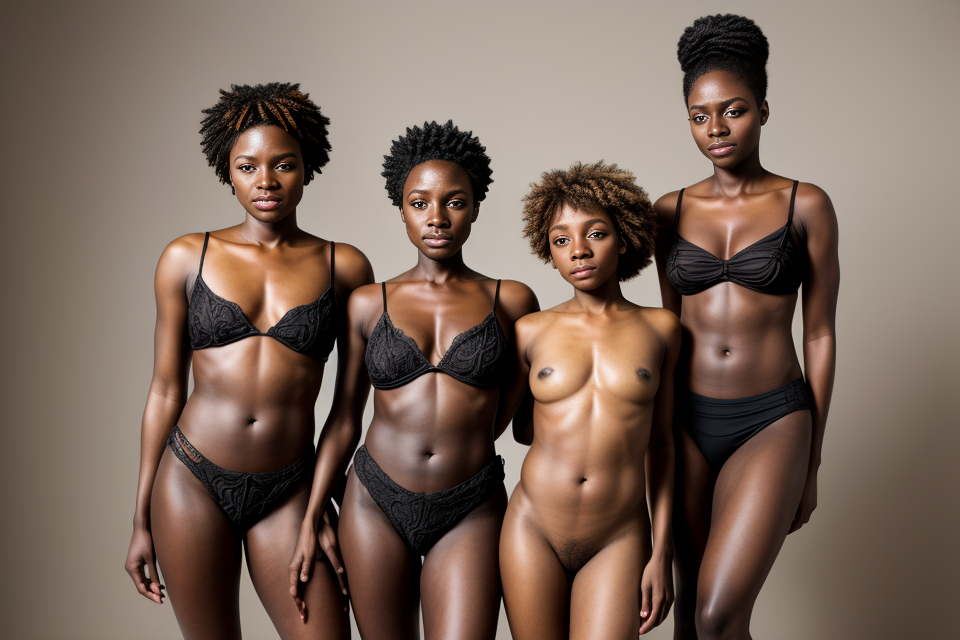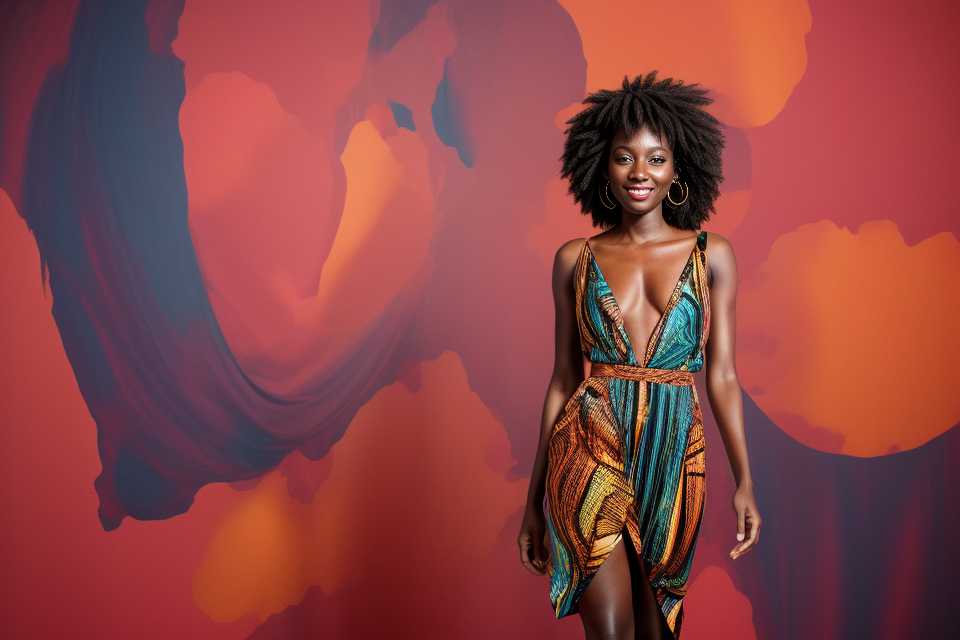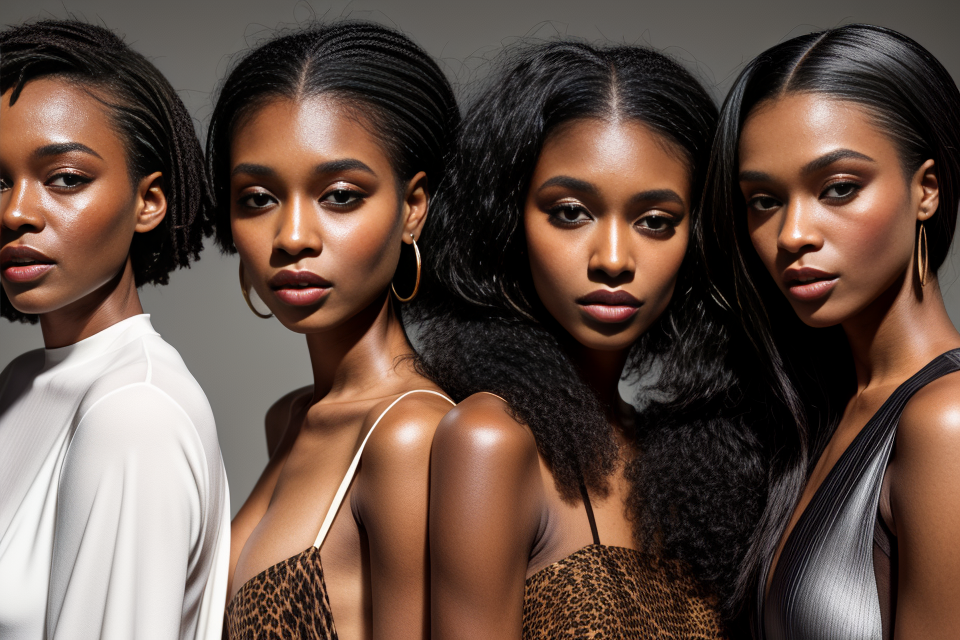African American skin is a topic that has been studied and debated for centuries. It is a subject that has been misunderstood and misrepresented by many. The range of tones in African American skin is vast and diverse, with shades ranging from deep ebony to honey brown. In this comprehensive guide, we will explore the different tones of African American skin and the factors that contribute to their unique coloring. We will delve into the history of skin tone in the African American community and how it has been perceived throughout the years. This guide aims to provide a better understanding of the beauty and complexity of African American skin, and to celebrate the range of tones that make it so unique.
Understanding the Basics of Skin Tone
The Science Behind Skin Tone
The science behind skin tone is a complex and intricate process that involves several factors. One of the main determinants of skin tone is melanin, a pigment that is produced by cells called melanocytes. Melanin is responsible for giving skin its color, and the amount of melanin present in the skin determines how dark or light it will appear.
There are two types of melanin: eumelanin and pheomelanin. Eumelanin is responsible for the brown or black color of skin, while pheomelanin is responsible for the red or yellow color of skin. The ratio of these two types of melanin determines the final skin tone.
Skin tone is also influenced by genetics, environment, and lifestyle factors. For example, exposure to the sun can increase the production of melanin, leading to a darker skin tone. Conversely, lack of exposure to the sun can lead to a lighter skin tone.
In addition to melanin, other factors such as blood flow, hydration, and the thickness of the skin’s outer layer can also affect skin tone. For instance, increased blood flow to the skin can give it a rosy or flushed appearance, while dehydration can cause the skin to appear dry and dull.
Understanding the science behind skin tone is important for understanding the range of tones found in African American skin. By examining the factors that contribute to skin tone, we can gain a better appreciation for the diversity of skin tones within this community.
Factors Affecting Skin Tone
- Genetics: The genetic makeup of an individual plays a significant role in determining their skin tone. This includes factors such as the presence or absence of melanin, the amount of melanin produced, and the type of melanin produced.
- Environment: Environmental factors such as sun exposure, pollution, and diet can also affect skin tone. For example, prolonged sun exposure can lead to skin darkening, while a lack of sun exposure can result in lighter skin.
- Ethnicity: An individual’s ethnic background also plays a role in determining their skin tone. For example, individuals of African descent tend to have higher levels of melanin in their skin, resulting in darker skin tones, while individuals of European descent tend to have lower levels of melanin, resulting in lighter skin tones.
- Health: Overall health and well-being can also impact skin tone. For example, individuals with certain medical conditions, such as vitiligo, may experience changes in skin tone.
- Cultural and Social Factors: Cultural and social factors can also influence skin tone. For example, some cultures may place a greater emphasis on lighter skin tones, leading to a preference for lighter-skinned individuals in media and advertising.
Common Misconceptions About Skin Tone
Light-Skinned vs. Dark-Skinned
One common misconception about skin tone is the notion that it is a binary classification of “light-skinned” and “dark-skinned.” In reality, there is a wide range of skin tones within the African American community, and it is important to recognize and appreciate this diversity.
The “One-Drop Rule”
Another misconception is the idea of the “one-drop rule,” which suggests that anyone with even a small amount of African ancestry is considered black. This rule has been used to marginalize and discriminate against individuals with mixed ancestry, and it is important to understand that skin tone does not determine one’s identity or experiences.
The Association Between Skin Tone and Social Status
There is also a misconception that lighter skin tone is associated with higher social status or privilege. While historical discrimination and prejudice have led to lighter-skinned individuals being advantaged in certain contexts, it is important to recognize that skin tone does not determine one’s experiences or opportunities.
The Relationship Between Skin Tone and Health
Finally, there is a misconception that lighter skin tone is healthier or more attractive than darker skin tone. This is simply not true, and it is important to celebrate and appreciate the diversity of skin tones within the African American community.
The Variety of Tones in African American Skin
Darkest to Lightest: A Spectrum of Tones
African American skin comes in a wide range of tones, from the darkest to the lightest. This spectrum of tones is influenced by a variety of factors, including genetics, geography, and environmental factors. Understanding the different tones of African American skin can help individuals better appreciate the diversity of this community and promote a more inclusive and accurate representation of African American individuals.
Factors Influencing Tone
Several factors can influence the tone of African American skin, including:
- Genetics: The melanin content in African American skin is influenced by genetics, with individuals inheriting different amounts of melanin from their parents. Melanin is the pigment that gives skin its color and helps protect against UV radiation.
- Geography: The climate and environment in which an individual lives can also affect the tone of their skin. For example, individuals living in areas with high levels of sun exposure may have darker skin tones to better protect against UV radiation.
- Environmental factors: Environmental factors such as diet, lifestyle, and skin care can also impact the tone of African American skin. For example, a diet rich in fruits and vegetables can help maintain healthy skin, while excessive sun exposure or the use of harsh skincare products can lead to damage and discoloration.
Tone Classification
African American skin can be classified into several categories based on tone, including:
- Dark: Individuals with dark skin tones have a higher concentration of melanin in their skin, which provides more protection against UV radiation. Dark skin tones can range from a deep brown to a nearly black color.
- Medium-dark: Individuals with medium-dark skin tones have a moderate amount of melanin in their skin, giving them a slightly lighter brown tone than those with dark skin.
- Medium: Individuals with medium skin tones have a lower concentration of melanin in their skin, resulting in a lighter brown tone.
- Medium-light: Individuals with medium-light skin tones have even less melanin in their skin, resulting in a light brown tone.
- Light: Individuals with light skin tones have the least amount of melanin in their skin, resulting in a light pink or beige tone.
Celebrating Diversity
African American skin comes in a wide range of tones, and it is important to celebrate this diversity. By recognizing and appreciating the different tones of African American skin, we can promote a more inclusive and accurate representation of this community. This can help combat harmful stereotypes and promote a more positive image of African American individuals.
Celebrating the Diversity of African American Skin Tones
African American skin is incredibly diverse, with a wide range of tones that reflect the rich cultural heritage of the African diaspora. Each tone is unique and beautiful, and it’s important to celebrate and embrace this diversity. Here are some ways to appreciate the variety of tones in African American skin:
- Education: Learn about the history of African American skin and the many factors that have contributed to its diversity. Understanding the context of skin tone can help combat colorism and promote self-love and acceptance.
- Representation: Support media that features diverse characters with different skin tones. This includes books, movies, TV shows, and more. By seeing ourselves represented in media, we can feel more seen and validated.
- Community: Join online communities or in-person groups that celebrate African American skin. These can be spaces for sharing stories, tips, and advice related to skincare, beauty, and self-acceptance.
- Fashion: Embrace trends that celebrate and showcase different skin tones. This includes wearing colors that complement and enhance natural skin tone, as well as featuring models of different skin tones in fashion campaigns.
- Advocacy: Use your voice to advocate for greater representation and inclusivity in society. This can include supporting organizations that work towards combating colorism and promoting self-love and acceptance.
By celebrating the diversity of African American skin tones, we can promote self-love, inclusivity, and acceptance. Let’s embrace and celebrate our unique beauty, and encourage others to do the same.
The Impact of Society on Perceptions of Skin Tone
- Cultural and historical factors have played a significant role in shaping society’s perceptions of skin tone.
- Slavery and segregation: During these periods, lighter skin was often associated with privilege and power, while darker skin was seen as inferior and subordinate.
- This association persisted even after slavery was abolished, and it contributed to the development of a racial hierarchy in which lighter skin was privileged.
- Media and advertising: The media has historically perpetuated the idea that lighter skin is more attractive and desirable.
- Advertisements for skin bleaching products and cosmetics often featured models with lighter skin, further reinforcing this message.
- Colorism: Colorism refers to the practice of discriminating against individuals with darker skin tones.
- This form of discrimination is often internalized by people of color, leading to a preference for lighter skin within communities.
- Slavery and segregation: During these periods, lighter skin was often associated with privilege and power, while darker skin was seen as inferior and subordinate.
- The impact of these perceptions can be seen in various aspects of society.
- Social: Discrimination based on skin tone can lead to exclusion from social networks and opportunities.
- Psychological: Internalized colorism can lead to lower self-esteem, self-hatred, and other mental health issues.
- Economic: Lighter-skinned individuals may have an advantage in the job market and may earn more than their darker-skinned counterparts.
- It is important to recognize and challenge these societal perceptions in order to promote a more inclusive and equitable society.
- Educating people about the history and impact of colorism can help to dismantle these harmful beliefs.
- Promoting diversity and representation in media and advertising can also help to change the way society views skin tone.
- Encouraging self-love and self-acceptance for all skin tones can lead to greater self-esteem and well-being for individuals.
Embracing and Celebrating Your Skin Tone
The Benefits of Self-Love and Acceptance
- Cultivating self-love and acceptance has a positive impact on mental health and overall well-being.
- Increased self-esteem: Accepting and appreciating your skin tone can boost your self-esteem and self-worth, leading to a more positive self-image.
- Reduced anxiety and depression: Embracing your natural beauty can reduce feelings of inadequacy and improve mental health, helping you to develop a more positive outlook on life.
- Improved relationships and social interactions.
- Stronger self-confidence: When you love and accept yourself, you are more likely to feel comfortable in social situations, which can lead to stronger connections with others.
- More genuine interactions: When you are secure in your own skin, you are better able to connect with others authentically, fostering deeper and more meaningful relationships.
- Enhanced ability to advocate for yourself and others.
- Standing up for your beliefs: When you have a strong sense of self-love and acceptance, you are better equipped to stand up for yourself and your beliefs, both personally and professionally.
- Empowering others: By embracing your skin tone and sharing your story, you can empower others to do the same, creating a positive ripple effect in your community.
Tips for Embracing Your Skin Tone
- Start by educating yourself about the different skin tones found within the African American community.
- This will help you better understand and appreciate the range of beauty found within your community.
- Practice self-love and self-acceptance.
- Embrace your natural beauty and celebrate your unique features.
- Recognize that your skin tone is a part of your identity and should be celebrated, not hidden or changed.
- Surround yourself with positive influences.
- Seek out images and messages that celebrate and uplift African American beauty.
- Avoid sources that promote harmful stereotypes or unrealistic beauty standards.
- Share your story.
- Use your platform to share your experiences and thoughts on skin tone and beauty within the African American community.
- Help others feel empowered to embrace their own beauty and celebrate their unique features.
- Remember, your skin tone is not a measure of your worth.
- Recognize that your skin tone does not determine your value as a person.
- Let go of any insecurities or negative thoughts related to your skin tone and focus on celebrating your unique beauty.
Role Models and Inspiration for Dark-Skinned Individuals
Dark-skinned individuals often seek role models and inspiration to embrace and celebrate their unique skin tone. The following section highlights a few prominent figures who have broken barriers and inspired others with their achievements and activism.
- Barbara Jordan: The late American politician, lawyer, and educator was a trailblazer for dark-skinned women. Jordan became the first African American woman to be elected to the Texas Senate and later served as a member of the U.S. House of Representatives. Her dedication to public service and unwavering commitment to civil rights have made her a role model for many.
- Oprah Winfrey: Media mogul Oprah Winfrey is another influential figure for dark-skinned individuals. She overcame a difficult childhood to become one of the most successful and influential women in the world. Her talk show, media empire, and philanthropic efforts have inspired countless people, including those with dark skin, to pursue their dreams and make a positive impact on the world.
- Marsai Martin: At just 18 years old, Marsai Martin is a rising star and a source of inspiration for young, dark-skinned girls. The actress and producer became the youngest executive producer in Hollywood history with the release of her film “Little” in 2019. Martin’s success in the entertainment industry is proof that young, dark-skinned individuals can achieve their goals and make a difference.
- Serena Williams: Tennis superstar Serena Williams has not only dominated the world of sports but has also become a powerful voice for social justice and equality. Williams has spoken openly about her experiences with racism and sexism in the sports world and has used her platform to advocate for change. Her achievements and advocacy have inspired many individuals, including those with dark skin, to strive for greatness and fight for a more just world.
- Harry F. Ward: Although less well-known than the other figures on this list, Harry F. Ward was a pioneering civil rights activist and a prominent figure in the early 20th-century African American community. Ward was a founder of the Niagara Movement, a precursor to the NAACP, and dedicated his life to fighting for the rights of African Americans. His work and dedication continue to inspire those seeking social justice and equality today.
These role models and others like them demonstrate that individuals with dark skin can achieve greatness and make a difference in the world. By celebrating and embracing their unique skin tone, dark-skinned individuals can feel empowered to pursue their dreams and inspire others to do the same.
Making a Positive Change in the Way We View Skin Tone
The Importance of Education and Awareness
The Role of Education in Changing Societal Perceptions
Education plays a critical role in shaping societal perceptions and beliefs about skin tone. By providing a comprehensive understanding of the range of tones in African American skin, we can challenge the limited and often negative portrayals of darker skin in media and popular culture. This includes exploring the historical context of skin tone and its role in shaping societal hierarchies, as well as highlighting the diversity and beauty of African American skin tones.
Raising Awareness about the Harmful Effects of Skin Bleaching
Another crucial aspect of education and awareness is addressing the harmful effects of skin bleaching. Skin bleaching, the use of chemicals to lighten the skin, is a practice that disproportionately affects people of color, including African Americans. By educating individuals about the potential health risks associated with skin bleaching, as well as the negative psychological impact it can have on self-esteem and body image, we can work towards discouraging this harmful practice.
Encouraging Positive Representation in Media and Advertising
Education and awareness can also involve encouraging positive representation of African American skin tones in media and advertising. By promoting diverse and inclusive messaging, we can challenge the narrow beauty standards that have historically favored lighter skin tones. This includes advocating for more realistic and accurate portrayals of African American skin tones in movies, television, and advertising, as well as supporting diverse voices in the media industry.
Creating Safe Spaces for Discussion and Support
Finally, education and awareness can involve creating safe spaces for discussion and support around skin tone. This includes facilitating open and honest conversations about the experiences and emotions surrounding skin tone, as well as providing resources and support for individuals who may be struggling with issues related to skin tone. By fostering a supportive and inclusive community, we can work towards building a more positive and accepting society.
Advocating for Diversity and Inclusion
Embracing the Richness of Diverse Skin Tones
- Encouraging acceptance and appreciation of the full spectrum of skin tones within the African American community
- Promoting the understanding that every skin tone is beautiful and unique, and should be celebrated
- Highlighting the importance of representation and inclusivity in media and advertising
Fostering an Open Dialogue on Skin Tone and Identity
- Creating safe spaces for individuals to share their experiences and feelings about skin tone and its impact on self-identity
- Encouraging open and honest conversations about the effects of colorism and discrimination on mental health and well-being
- Facilitating workshops and educational programs to increase awareness and understanding of skin tone and its social implications
Supporting Diversity and Inclusion in Industries and Institutions
- Advocating for diverse representation in media, fashion, and beauty industries
- Encouraging the implementation of inclusive policies and practices in workplaces and educational institutions
- Supporting organizations and initiatives that promote diversity and inclusion across all sectors of society
Empowering Individuals to Embrace and Celebrate Their Skin Tone
- Providing resources and support for individuals to develop a positive self-image and self-worth, regardless of skin tone
- Encouraging self-expression and self-affirmation through fashion, art, and other creative outlets
- Fostering a sense of community and shared experience among individuals with diverse skin tones, to combat feelings of isolation and marginalization
The Future of Skin Tone and Beauty Standards
The Influence of Social Media
- The rise of social media platforms has significantly impacted the way people perceive beauty standards.
- Social media influencers and celebrities have a considerable influence on their followers, often promoting specific beauty ideals.
- The growing trend of promoting body positivity and self-love on social media is helping to change the narrative around skin tone.
The Growing Importance of Self-Acceptance
- The movement towards self-acceptance and self-love is empowering individuals to embrace their unique features, including skin tone.
- The concept of “black girl magic” and “dark-skin glow” has emerged, promoting the appreciation of darker skin tones.
- As more people celebrate their natural beauty, the traditional Eurocentric beauty standards are being challenged and may eventually give way to a more inclusive view of beauty.
The Role of Education and Awareness
- Educational programs and campaigns are essential in shifting societal perspectives on skin tone and beauty.
- These initiatives aim to raise awareness about the historical and cultural factors that have contributed to the bias against darker skin tones.
- As more people become educated about the issue, they can actively work towards dismantling these biases and promoting a more inclusive definition of beauty.
The Shift Towards a More Inclusive Beauty Industry
- The beauty industry is slowly but surely becoming more inclusive, with a growing range of foundation shades and the development of products specifically designed for individuals with darker skin tones.
- This shift towards inclusivity is a reflection of the changing attitudes towards skin tone and beauty standards.
- As the industry continues to evolve, it is expected that the traditional beauty standards will continue to diversify, and darker skin tones will be celebrated and represented more accurately.
By focusing on the future of skin tone and beauty standards, it is evident that change is underway. Social media, self-acceptance, education, and the beauty industry are all contributing to a more inclusive and diverse understanding of beauty. As these changes continue to take shape, it is crucial to remain vigilant and continue promoting the acceptance and celebration of all skin tones.
FAQs
1. What is the range of tones in African American skin?
The range of tones in African American skin can vary greatly, from very light to very dark. Some people may have skin that is nearly transparent, while others may have skin that is deep brown or even black. The tones of African American skin are influenced by a combination of genetics and environmental factors, such as sun exposure and skin care practices.
2. Is there a typical tone of African American skin?
There is no typical tone of African American skin, as the range of tones is quite broad. Some people may have lighter skin due to a higher proportion of European ancestry, while others may have darker skin due to a higher proportion of African ancestry. Additionally, some people may have skin that is more uniformly pigmented, while others may have skin that is more speckled or mottled in appearance.
3. Can the tone of African American skin change over time?
Yes, the tone of African American skin can change over time due to a variety of factors. For example, exposure to the sun can cause skin to become darker, while avoiding the sun or using sun protection can cause skin to become lighter. Hormonal changes can also affect skin tone, as can certain medications and medical conditions.
4. Is there a “correct” tone of African American skin?
There is no “correct” tone of African American skin, as each person’s skin is unique and beautiful in its own way. It is important to embrace and celebrate the natural tones of one’s skin, rather than trying to conform to societal standards or ideals. Additionally, it is important to protect and care for one’s skin, regardless of tone, in order to maintain its health and beauty.



